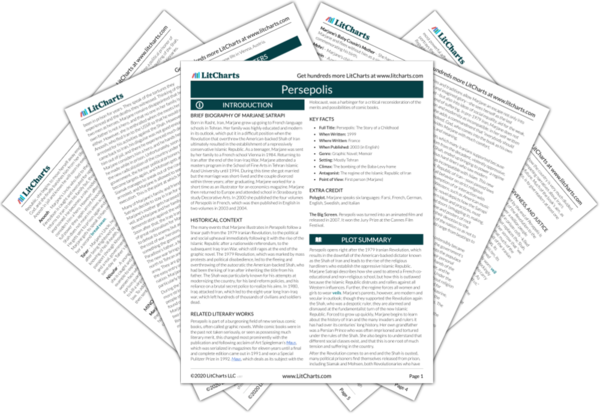When the Revolution comes, Marjane, like her family, rejoices. After decades under the despotic American-backed Shah, she and her family believe that this moment will ensure that the Iranian people will finally be free to decide for themselves who will lead their country and how. Put another way, Marjane is an Iranian patriot and a nationalist, in the sense that she believes profoundly in the value and need for an independent Iran ruled by Iranians. Marjane’s love for her country and belief that it should be free is so great that she feels the urge to fight for it, and glorifies those who do fight for it—particularly those people who die in the name of the cause: martyrs. Marjane, just a child at this time, thinks of heroism in romantic terms, and sees martyrdom especially as extremely positive and desirable. In fact, Marjane hopes her own family members will be heroes and she is disappointed that her father is not a hero. She is ecstatic when it turns out that Anoosh, her uncle, has had to flee to the USSR to protect himself from the Shah’s government against which he was fighting.
Yet as Marjane starts to come to grips with the actual consequences of martyrdom and heroism—Anoosh, for example, gets executed by the new regime because of his former political activities—her positive feelings about heroism and martyrdom begin to fade. Even more importantly, as the Revolution results in a new regime even more oppressive than the Shah’s, and an Iran ruled by Iranians turns out to be no better and in many ways worse than an Iran ruled by foreign powers, Marjane is forced to grapple with the very notion of nationalism. What country or which people should be the object of her nationalism? Though before and just after the Revolution she complains that her father is “no patriot” because of his pessimism, as she grows up and sees the actions and impact of the Islamic Republic she begins to recognize her own country’s stubborn foreign policy and ideologically-driven warmongering for what they are. She realizes that the boys sent off to war as martyrs are being brainwashed and used, their lives wasted, in service to nationalism. She sees that just as nationalism can overthrow a dictator, so it can also be used to prop up a dictator. And yet, at the same time, when she hears the Iranian National Anthem, Marjane is “overwhelmed” with emotion. Facing this conundrum in her feelings about her country, Marjane begins to understand that she can both love her country and hate it at the same time. She begins to understand that a country is not one monolithic culture, one monolithic religion (her neighbors are Jewish, for example), nor one monolithic people: she sees how the people in Tehran make fun of southern Iranians, how the country is very much divided, and how there are many competing narratives about Iran’s past, present, and especially future. Much of the book’s aim, as Marjane explains in her preface, is to give readers at least one narrative about Iran: her own.
Nationalism, Heroism, and Martyrdom ThemeTracker

Nationalism, Heroism, and Martyrdom Quotes in Persepolis
“The Revolution is like a bicycle. When the wheels don’t turn, it falls.”
As for me, I love the King, he was chosen by God.
“You know, my child, since the dawn of time, dynasties have succeeded each other but the kings always kept their promises. The Shah kept none.”
“All the country’s money went into ridiculous celebrations of the 2500 years of dynasty and other frivolities…all of this to impress heads of state; the population couldn’t have cared less.”
“As long as there is oil in the middle east we will never have peace.”
My father was not a hero, my mother wanted to kill people…so I went out to play in the street.
It wasn’t only the government that changed. Ordinary people changed too.
“The real Islamic invasion has come from our own government.”
“I wish he were alive and in jail rather than dead and a hero.”
“To have the Iraqis attack, and to lose in an instant everything you had built over a lifetime, that’s one thing…but to be spat upon by your own kind, it is intolerable!”
“Our country has always known war and martyrs, so, like my father said: ‘When a big wave comes, lower your head and let it pass!’”
“To die a martyr is to inject blood into the veins of society.”
















